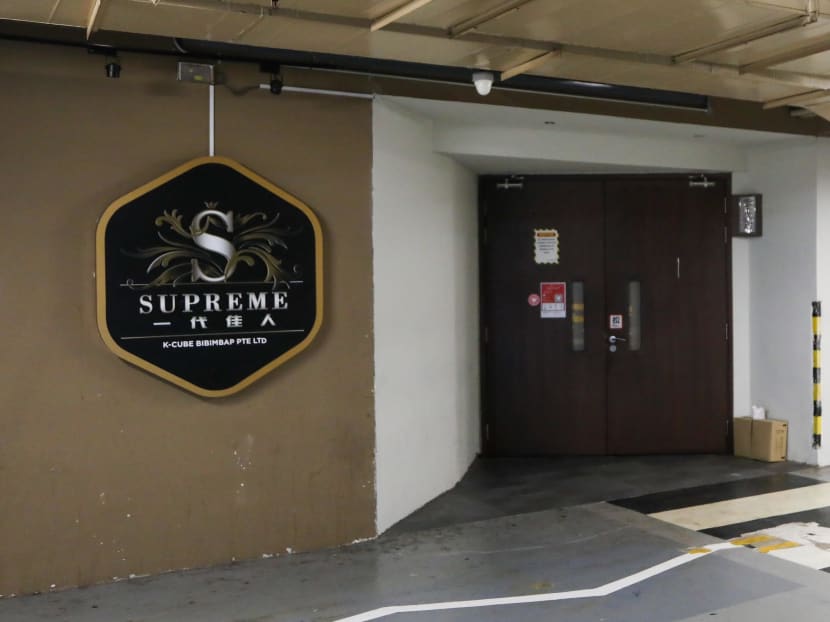Evidence ‘doesn’t suggest’ Covid-19 virus jumped from KTVs to Jurong Fishery Port, says Shanmugam
SINGAPORE — Home Affairs and Law Minister K Shanmugam has dispelled the notion that the Covid-19 virus had spread from karaoke, or KTV, lounges to the Jurong Fishery Port, and countered suggestions that the authorities were either in “cahoots” with the lounge operators or “naive” about the nature of their business.
- Evidence does not suggest the spread of Covid-19 from KTV cluster to Jurong Fishery Port, said Home Affairs and Law Minister K Shanmugam
- The evidence suggests the virus came from the region to the port, he added
- Mr Shanmugam also addressed questions on enforcement actions over errant KTV bars
SINGAPORE — Home Affairs and Law Minister K Shanmugam has dispelled the notion that the Covid-19 virus had spread from karaoke, or KTV, lounges to the Jurong Fishery Port, and countered suggestions that the authorities were either in “cahoots” with the lounge operators or “naive” about the nature of their business.
The “evidence that we have doesn’t suggest” that the Jurong Fishery Port cluster was a result of the coronavirus spreading from the KTV clusters, said Mr Shanmugam, who spoke in Parliament on Monday (July 26).
Evidence instead suggests that the virus came from the region to the fishery port.
Mr Shanmugam, who spoke after the co-chairs of the multi-ministry task force dealing with the pandemic delivered their respective ministerial statements on the Government’s latest response to the pandemic, was responding to several parliamentary questions related to the two active clusters.
Referencing what he described as “quite an unbalanced” article by Japanese publication Nikkei, Mr Shanmugam said the authorities were “neither in cahoots with the KTV operators, nor are we as naive as some suggest”.
While Mr Shanmugam did not specify which article he was referring to, a recent report from Nikkei described KTVs as playgrounds for the rich which “draw regular patrons from all segments of society, including uniformed military leaders and civil servants alike”.
He said it would be wrong to automatically treat all KTV operators who want to provide food and beverage (F&B) services as crooks.
“Several are genuine operators. They want to pivot over to provide F&B (because) that is the only way they can survive,” he said, adding that many cater to families.
Nevertheless, Mr Shanmugam said the Government is aware that there are some "dodgy" KTV clubs.
He said while it would appear commonsensical to deny such “dodgy and doubtful” operators a chance to convert their licence to providing F&B services, it is not that “straightforward”.
If so, this would mean approving agencies could deny an operator, who has committed no prior offences, permission to convert his licence because they do not think that the operator will be able to follow the rules in the future.
“I will also say realistically, the people who are going to cheat (or) do illegal things, will do them anyway,” he said.
“They will use lounges, flats, warehouses, various places... regardless of whether we allow the change to F&B.”
KTV ENFORCEMENT ACTION
Leader of the Opposition Pritam Singh asked whether the enforcement regime at pivoted establishments had been heightened.
“Minister mentioned 202 enforcement actions from October last year to July this year. But was there some specific attention paid on pivoted KTV establishments?” he asked.
On whether the enforcement regime had been heightened, Mr Shanmugam said “we can assume that if there was one enforcement action per day, it's quite intense and it's been so from October of last year to July of this year”.
He added that that was apart from what safe distance ambassadors did.
On whether there was a particular focus on pivoted outlets, Mr Shanmugam said: “Not all were targeted at pivoted outlets. In fact, there were a number who were not supposed to be operating at all.”
He added that some F&B operators which are not the pivoted types have also been breaching safety measures.
Mr Singh also asked if the KTV bars that had been found to breach regulations would have their licences revoked.
He added that he had received emails from members of the public about warnings that they had given the authorities about some of these KTV establishments.
Therefore, he asked how many warnings or pieces of feedback the Ministry of Home Affairs and other agencies had received on potential egregious safety violations in KTV establishments.
In responding, Mr Shanmugam said he assumed that “Mr Singh is not asking for closing down every operation as long as there’s any breach”.
“There is a framework, depending on the nature of the breach, there will be a penalty, and the penalty is transparent and the penalty will be imposed according to the kind of breach that has been committed, and I think most people will know there's also a points system for breaches, which leads to closure,” Mr Shanmugam added.
On Mr Singh’s question on whether warnings given by the public were taken seriously, Mr Shanmugam said that most MPs will know how, in general, the police intelligence system is expected to work.
“Police have their own intelligence framework, their own ground framework, and public tip-offs, a lot of crimes are solved by public tip-offs, and they are important, they’re taken seriously. And I assume that goes into the assessment framework on what operations to conduct.”











